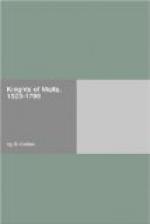The supreme control of the Order was vested in the Chapter-General, consisting of all the Knights Grand Cross. Though these Chapters-General were often convened in the early history of the Order, their difficulty of assembly and their clumsy method of procedure made them less and less frequently summoned, as the Grand Master had it in his power to convoke it when he pleased, though an interval of five years—later extended to ten—had been sanctioned by custom. In the seventeenth century the institution fell into utter disuse, and there was no meeting of the Chapter-General from 1631 to 1776, when its uselessness was finally demonstrated.
When the Chapter-General was not sitting the government of the Order was carried on by the Grand Master and the Councils, known as the Ordinary, Complete, Secret, and Criminal. The Ordinary Council consisted of the Grand Master, the conventual bailiffs, together with any Grand Cross residing at the Convent. This Council, as its name indicates, transacted the ordinary business of government, which mainly consisted of appointing to these offices and making those arrangements which were not definitely assigned to the Grand Master himself. The Secret and Criminal Councils, respectively, dealt with foreign affairs and offences against the Statutes, while the Complete, consisting of the Ordinary Council with the addition of two Knights from each langue of more than five years’ residence at the Convent, dealt with appeals from the other Councils. In the later days of the Order the pernicious practice of appealing to the Pope destroyed all semblance of authority in this Council.
The election of the Grand Master was an exceedingly complicated affair, the intention being to prevent intrigue. Each langue solemnly elected three Knights to represent it, and this body of twenty-four chose a triumvirate, which consisted of a Knight, a chaplain, and a servant-at-arms. These three co-opted a fourth, and the four a fifth, and so on, till the number of sixteen was reached, and this body of sixteen elected the Grand Master. Every stage of the proceedings was hedged about with meticulous precautions to prevent intrigue and corruption, and it was a thoroughly typical medieval attempt to secure an honest election.




